Analysis of Entrepreneurial Ventures, SMEs, and Social Economy
VerifiedAdded on 2020/10/22
|15
|4611
|62
Report
AI Summary
This report provides a comprehensive analysis of entrepreneurial ventures and small and medium-sized enterprises (SMEs). It explores different types of entrepreneurial ventures, including social, scalable, and small business ventures, and examines their relationship with entrepreneurship typologies. The report investigates the impact of SMEs on the UK economy, highlighting their role in employment generation and economic growth, with statistical figures and illustrations. It also analyzes the contribution of SMEs and start-ups to the growth of the social economy in the post-Brexit context. Furthermore, the report delves into the characteristics and skills of successful entrepreneurs, differentiating them from other managers, and assesses entrepreneurial mindsets and motivations. Finally, it examines how background and experience can hinder or foster entrepreneurship. The report provides a detailed overview of the subject, supported by relevant examples and data.

Entrepreneurship and Small
Business Management
Business Management
Paraphrase This Document
Need a fresh take? Get an instant paraphrase of this document with our AI Paraphraser
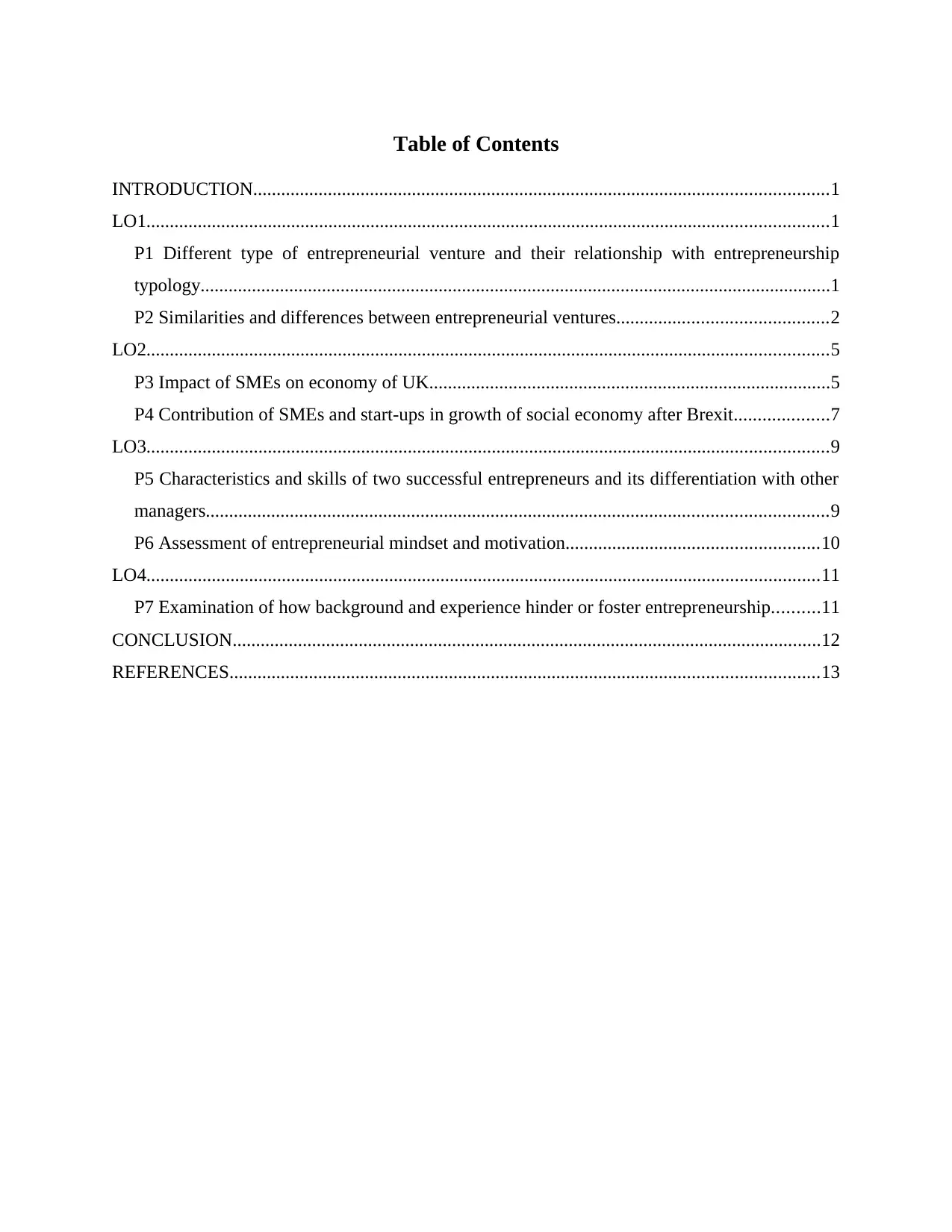
Table of Contents
INTRODUCTION...........................................................................................................................1
LO1..................................................................................................................................................1
P1 Different type of entrepreneurial venture and their relationship with entrepreneurship
typology.......................................................................................................................................1
P2 Similarities and differences between entrepreneurial ventures.............................................2
LO2..................................................................................................................................................5
P3 Impact of SMEs on economy of UK......................................................................................5
P4 Contribution of SMEs and start-ups in growth of social economy after Brexit....................7
LO3..................................................................................................................................................9
P5 Characteristics and skills of two successful entrepreneurs and its differentiation with other
managers.....................................................................................................................................9
P6 Assessment of entrepreneurial mindset and motivation......................................................10
LO4................................................................................................................................................11
P7 Examination of how background and experience hinder or foster entrepreneurship..........11
CONCLUSION..............................................................................................................................12
REFERENCES..............................................................................................................................13
INTRODUCTION...........................................................................................................................1
LO1..................................................................................................................................................1
P1 Different type of entrepreneurial venture and their relationship with entrepreneurship
typology.......................................................................................................................................1
P2 Similarities and differences between entrepreneurial ventures.............................................2
LO2..................................................................................................................................................5
P3 Impact of SMEs on economy of UK......................................................................................5
P4 Contribution of SMEs and start-ups in growth of social economy after Brexit....................7
LO3..................................................................................................................................................9
P5 Characteristics and skills of two successful entrepreneurs and its differentiation with other
managers.....................................................................................................................................9
P6 Assessment of entrepreneurial mindset and motivation......................................................10
LO4................................................................................................................................................11
P7 Examination of how background and experience hinder or foster entrepreneurship..........11
CONCLUSION..............................................................................................................................12
REFERENCES..............................................................................................................................13
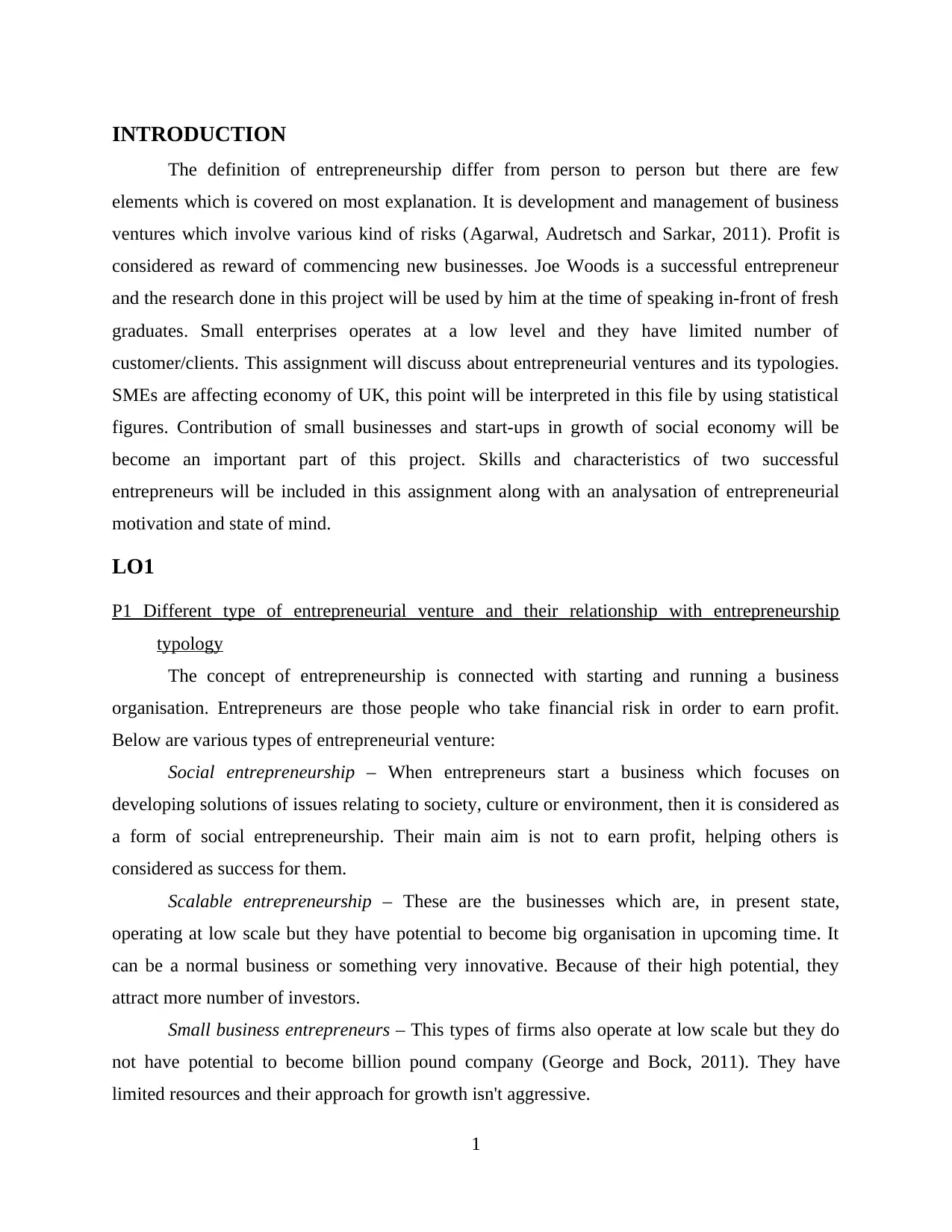
INTRODUCTION
The definition of entrepreneurship differ from person to person but there are few
elements which is covered on most explanation. It is development and management of business
ventures which involve various kind of risks (Agarwal, Audretsch and Sarkar, 2011). Profit is
considered as reward of commencing new businesses. Joe Woods is a successful entrepreneur
and the research done in this project will be used by him at the time of speaking in-front of fresh
graduates. Small enterprises operates at a low level and they have limited number of
customer/clients. This assignment will discuss about entrepreneurial ventures and its typologies.
SMEs are affecting economy of UK, this point will be interpreted in this file by using statistical
figures. Contribution of small businesses and start-ups in growth of social economy will be
become an important part of this project. Skills and characteristics of two successful
entrepreneurs will be included in this assignment along with an analysation of entrepreneurial
motivation and state of mind.
LO1
P1 Different type of entrepreneurial venture and their relationship with entrepreneurship
typology
The concept of entrepreneurship is connected with starting and running a business
organisation. Entrepreneurs are those people who take financial risk in order to earn profit.
Below are various types of entrepreneurial venture:
Social entrepreneurship – When entrepreneurs start a business which focuses on
developing solutions of issues relating to society, culture or environment, then it is considered as
a form of social entrepreneurship. Their main aim is not to earn profit, helping others is
considered as success for them.
Scalable entrepreneurship – These are the businesses which are, in present state,
operating at low scale but they have potential to become big organisation in upcoming time. It
can be a normal business or something very innovative. Because of their high potential, they
attract more number of investors.
Small business entrepreneurs – This types of firms also operate at low scale but they do
not have potential to become billion pound company (George and Bock, 2011). They have
limited resources and their approach for growth isn't aggressive.
1
The definition of entrepreneurship differ from person to person but there are few
elements which is covered on most explanation. It is development and management of business
ventures which involve various kind of risks (Agarwal, Audretsch and Sarkar, 2011). Profit is
considered as reward of commencing new businesses. Joe Woods is a successful entrepreneur
and the research done in this project will be used by him at the time of speaking in-front of fresh
graduates. Small enterprises operates at a low level and they have limited number of
customer/clients. This assignment will discuss about entrepreneurial ventures and its typologies.
SMEs are affecting economy of UK, this point will be interpreted in this file by using statistical
figures. Contribution of small businesses and start-ups in growth of social economy will be
become an important part of this project. Skills and characteristics of two successful
entrepreneurs will be included in this assignment along with an analysation of entrepreneurial
motivation and state of mind.
LO1
P1 Different type of entrepreneurial venture and their relationship with entrepreneurship
typology
The concept of entrepreneurship is connected with starting and running a business
organisation. Entrepreneurs are those people who take financial risk in order to earn profit.
Below are various types of entrepreneurial venture:
Social entrepreneurship – When entrepreneurs start a business which focuses on
developing solutions of issues relating to society, culture or environment, then it is considered as
a form of social entrepreneurship. Their main aim is not to earn profit, helping others is
considered as success for them.
Scalable entrepreneurship – These are the businesses which are, in present state,
operating at low scale but they have potential to become big organisation in upcoming time. It
can be a normal business or something very innovative. Because of their high potential, they
attract more number of investors.
Small business entrepreneurs – This types of firms also operate at low scale but they do
not have potential to become billion pound company (George and Bock, 2011). They have
limited resources and their approach for growth isn't aggressive.
1
⊘ This is a preview!⊘
Do you want full access?
Subscribe today to unlock all pages.

Trusted by 1+ million students worldwide
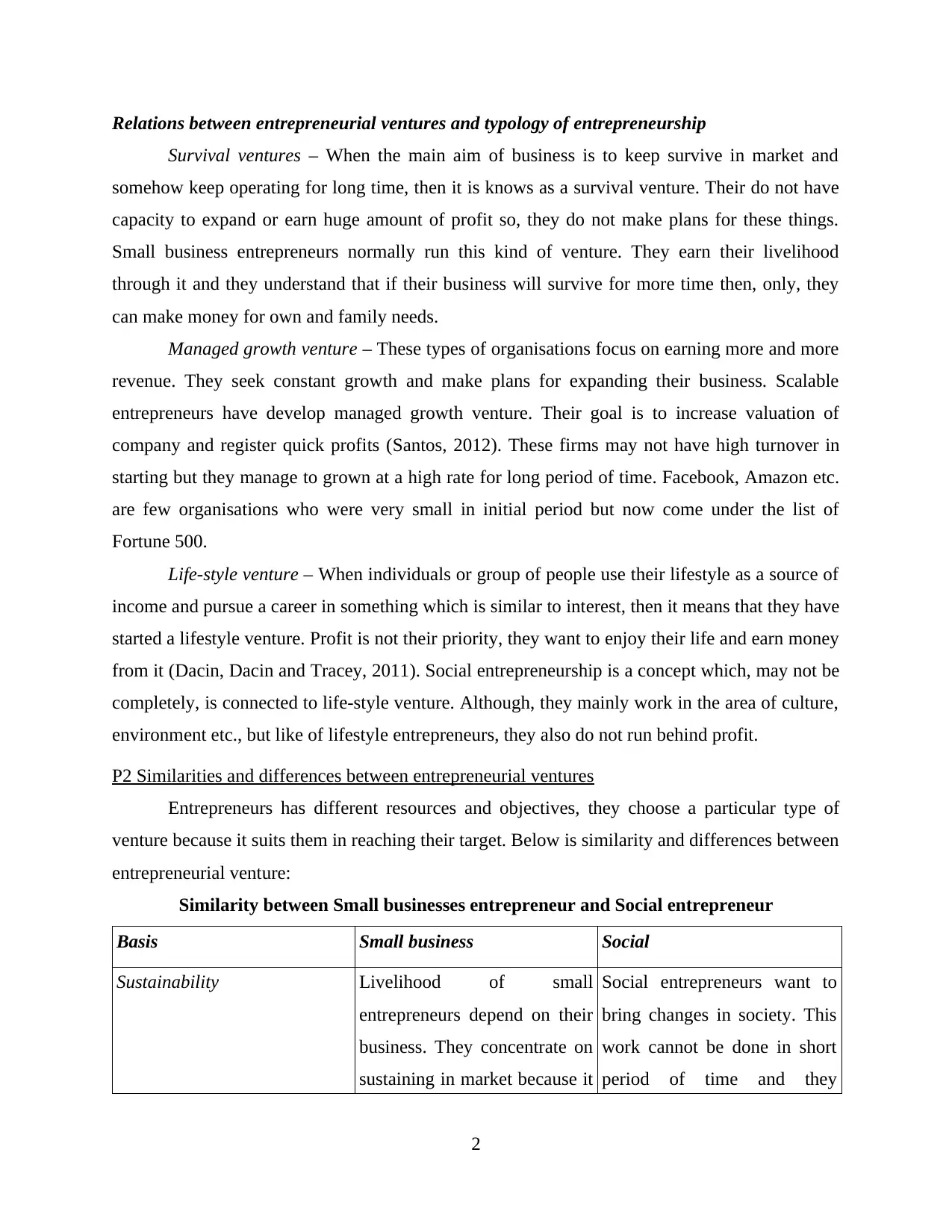
Relations between entrepreneurial ventures and typology of entrepreneurship
Survival ventures – When the main aim of business is to keep survive in market and
somehow keep operating for long time, then it is knows as a survival venture. Their do not have
capacity to expand or earn huge amount of profit so, they do not make plans for these things.
Small business entrepreneurs normally run this kind of venture. They earn their livelihood
through it and they understand that if their business will survive for more time then, only, they
can make money for own and family needs.
Managed growth venture – These types of organisations focus on earning more and more
revenue. They seek constant growth and make plans for expanding their business. Scalable
entrepreneurs have develop managed growth venture. Their goal is to increase valuation of
company and register quick profits (Santos, 2012). These firms may not have high turnover in
starting but they manage to grown at a high rate for long period of time. Facebook, Amazon etc.
are few organisations who were very small in initial period but now come under the list of
Fortune 500.
Life-style venture – When individuals or group of people use their lifestyle as a source of
income and pursue a career in something which is similar to interest, then it means that they have
started a lifestyle venture. Profit is not their priority, they want to enjoy their life and earn money
from it (Dacin, Dacin and Tracey, 2011). Social entrepreneurship is a concept which, may not be
completely, is connected to life-style venture. Although, they mainly work in the area of culture,
environment etc., but like of lifestyle entrepreneurs, they also do not run behind profit.
P2 Similarities and differences between entrepreneurial ventures
Entrepreneurs has different resources and objectives, they choose a particular type of
venture because it suits them in reaching their target. Below is similarity and differences between
entrepreneurial venture:
Similarity between Small businesses entrepreneur and Social entrepreneur
Basis Small business Social
Sustainability Livelihood of small
entrepreneurs depend on their
business. They concentrate on
sustaining in market because it
Social entrepreneurs want to
bring changes in society. This
work cannot be done in short
period of time and they
2
Survival ventures – When the main aim of business is to keep survive in market and
somehow keep operating for long time, then it is knows as a survival venture. Their do not have
capacity to expand or earn huge amount of profit so, they do not make plans for these things.
Small business entrepreneurs normally run this kind of venture. They earn their livelihood
through it and they understand that if their business will survive for more time then, only, they
can make money for own and family needs.
Managed growth venture – These types of organisations focus on earning more and more
revenue. They seek constant growth and make plans for expanding their business. Scalable
entrepreneurs have develop managed growth venture. Their goal is to increase valuation of
company and register quick profits (Santos, 2012). These firms may not have high turnover in
starting but they manage to grown at a high rate for long period of time. Facebook, Amazon etc.
are few organisations who were very small in initial period but now come under the list of
Fortune 500.
Life-style venture – When individuals or group of people use their lifestyle as a source of
income and pursue a career in something which is similar to interest, then it means that they have
started a lifestyle venture. Profit is not their priority, they want to enjoy their life and earn money
from it (Dacin, Dacin and Tracey, 2011). Social entrepreneurship is a concept which, may not be
completely, is connected to life-style venture. Although, they mainly work in the area of culture,
environment etc., but like of lifestyle entrepreneurs, they also do not run behind profit.
P2 Similarities and differences between entrepreneurial ventures
Entrepreneurs has different resources and objectives, they choose a particular type of
venture because it suits them in reaching their target. Below is similarity and differences between
entrepreneurial venture:
Similarity between Small businesses entrepreneur and Social entrepreneur
Basis Small business Social
Sustainability Livelihood of small
entrepreneurs depend on their
business. They concentrate on
sustaining in market because it
Social entrepreneurs want to
bring changes in society. This
work cannot be done in short
period of time and they
2
Paraphrase This Document
Need a fresh take? Get an instant paraphrase of this document with our AI Paraphraser
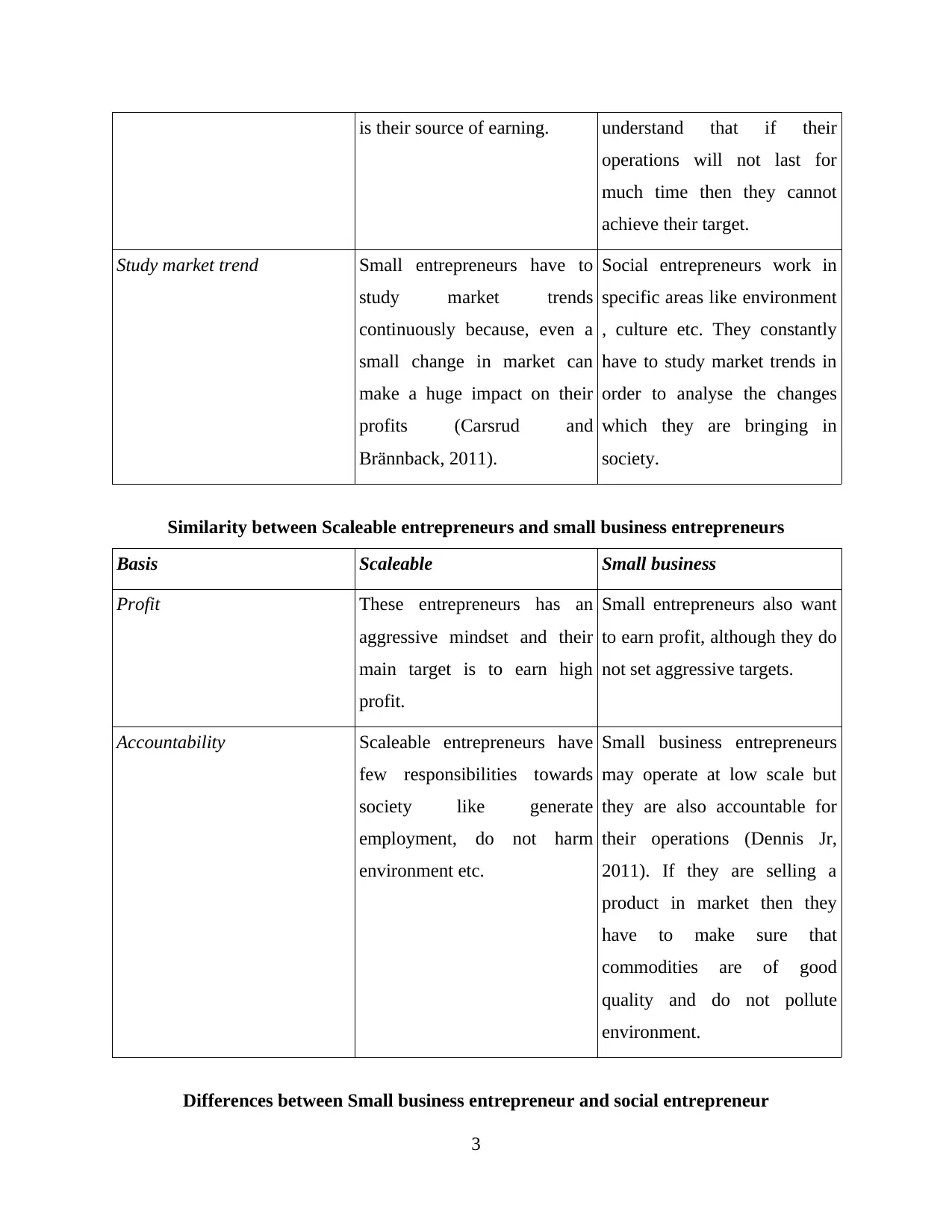
is their source of earning. understand that if their
operations will not last for
much time then they cannot
achieve their target.
Study market trend Small entrepreneurs have to
study market trends
continuously because, even a
small change in market can
make a huge impact on their
profits (Carsrud and
Brännback, 2011).
Social entrepreneurs work in
specific areas like environment
, culture etc. They constantly
have to study market trends in
order to analyse the changes
which they are bringing in
society.
Similarity between Scaleable entrepreneurs and small business entrepreneurs
Basis Scaleable Small business
Profit These entrepreneurs has an
aggressive mindset and their
main target is to earn high
profit.
Small entrepreneurs also want
to earn profit, although they do
not set aggressive targets.
Accountability Scaleable entrepreneurs have
few responsibilities towards
society like generate
employment, do not harm
environment etc.
Small business entrepreneurs
may operate at low scale but
they are also accountable for
their operations (Dennis Jr,
2011). If they are selling a
product in market then they
have to make sure that
commodities are of good
quality and do not pollute
environment.
Differences between Small business entrepreneur and social entrepreneur
3
operations will not last for
much time then they cannot
achieve their target.
Study market trend Small entrepreneurs have to
study market trends
continuously because, even a
small change in market can
make a huge impact on their
profits (Carsrud and
Brännback, 2011).
Social entrepreneurs work in
specific areas like environment
, culture etc. They constantly
have to study market trends in
order to analyse the changes
which they are bringing in
society.
Similarity between Scaleable entrepreneurs and small business entrepreneurs
Basis Scaleable Small business
Profit These entrepreneurs has an
aggressive mindset and their
main target is to earn high
profit.
Small entrepreneurs also want
to earn profit, although they do
not set aggressive targets.
Accountability Scaleable entrepreneurs have
few responsibilities towards
society like generate
employment, do not harm
environment etc.
Small business entrepreneurs
may operate at low scale but
they are also accountable for
their operations (Dennis Jr,
2011). If they are selling a
product in market then they
have to make sure that
commodities are of good
quality and do not pollute
environment.
Differences between Small business entrepreneur and social entrepreneur
3
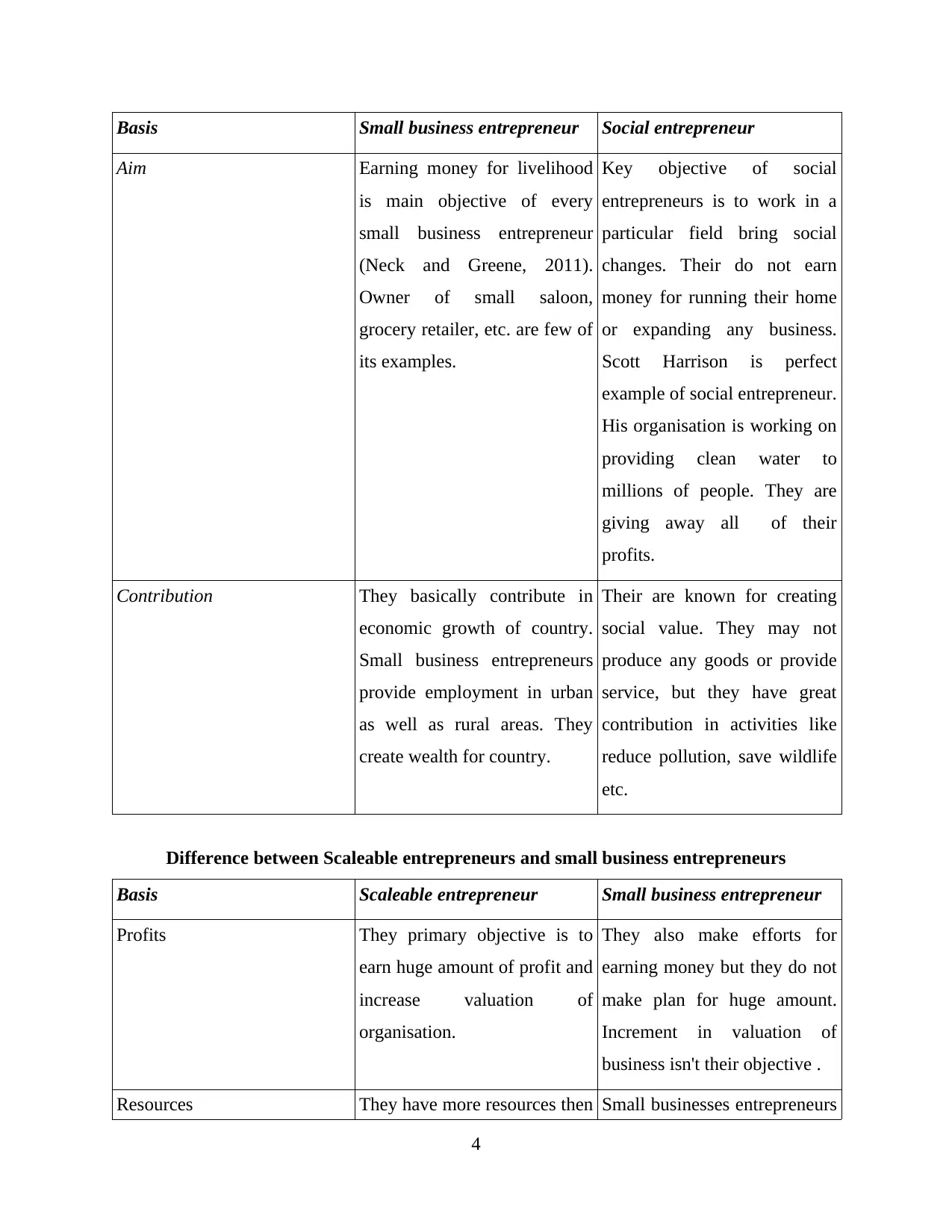
Basis Small business entrepreneur Social entrepreneur
Aim Earning money for livelihood
is main objective of every
small business entrepreneur
(Neck and Greene, 2011).
Owner of small saloon,
grocery retailer, etc. are few of
its examples.
Key objective of social
entrepreneurs is to work in a
particular field bring social
changes. Their do not earn
money for running their home
or expanding any business.
Scott Harrison is perfect
example of social entrepreneur.
His organisation is working on
providing clean water to
millions of people. They are
giving away all of their
profits.
Contribution They basically contribute in
economic growth of country.
Small business entrepreneurs
provide employment in urban
as well as rural areas. They
create wealth for country.
Their are known for creating
social value. They may not
produce any goods or provide
service, but they have great
contribution in activities like
reduce pollution, save wildlife
etc.
Difference between Scaleable entrepreneurs and small business entrepreneurs
Basis Scaleable entrepreneur Small business entrepreneur
Profits They primary objective is to
earn huge amount of profit and
increase valuation of
organisation.
They also make efforts for
earning money but they do not
make plan for huge amount.
Increment in valuation of
business isn't their objective .
Resources They have more resources then Small businesses entrepreneurs
4
Aim Earning money for livelihood
is main objective of every
small business entrepreneur
(Neck and Greene, 2011).
Owner of small saloon,
grocery retailer, etc. are few of
its examples.
Key objective of social
entrepreneurs is to work in a
particular field bring social
changes. Their do not earn
money for running their home
or expanding any business.
Scott Harrison is perfect
example of social entrepreneur.
His organisation is working on
providing clean water to
millions of people. They are
giving away all of their
profits.
Contribution They basically contribute in
economic growth of country.
Small business entrepreneurs
provide employment in urban
as well as rural areas. They
create wealth for country.
Their are known for creating
social value. They may not
produce any goods or provide
service, but they have great
contribution in activities like
reduce pollution, save wildlife
etc.
Difference between Scaleable entrepreneurs and small business entrepreneurs
Basis Scaleable entrepreneur Small business entrepreneur
Profits They primary objective is to
earn huge amount of profit and
increase valuation of
organisation.
They also make efforts for
earning money but they do not
make plan for huge amount.
Increment in valuation of
business isn't their objective .
Resources They have more resources then Small businesses entrepreneurs
4
⊘ This is a preview!⊘
Do you want full access?
Subscribe today to unlock all pages.

Trusted by 1+ million students worldwide
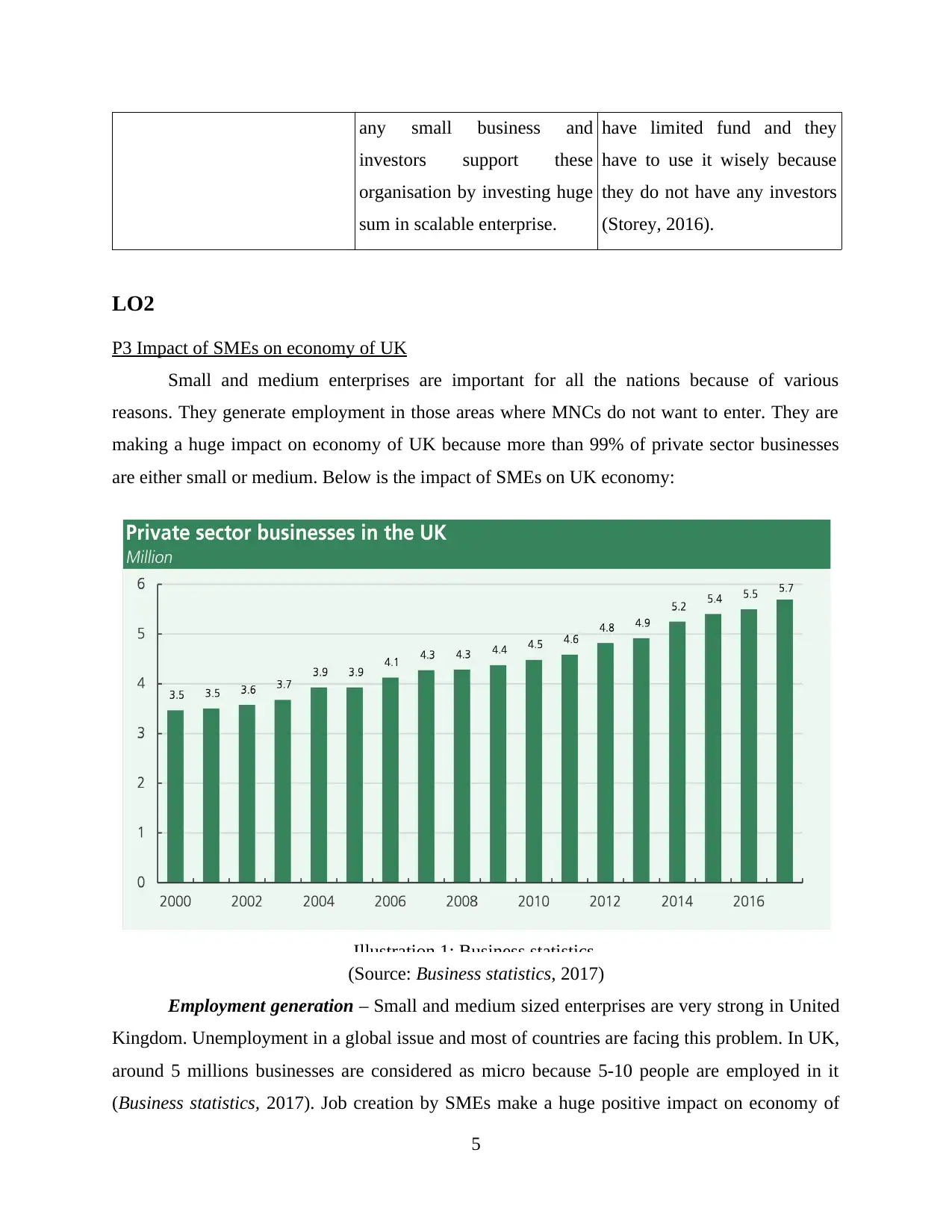
any small business and
investors support these
organisation by investing huge
sum in scalable enterprise.
have limited fund and they
have to use it wisely because
they do not have any investors
(Storey, 2016).
LO2
P3 Impact of SMEs on economy of UK
Small and medium enterprises are important for all the nations because of various
reasons. They generate employment in those areas where MNCs do not want to enter. They are
making a huge impact on economy of UK because more than 99% of private sector businesses
are either small or medium. Below is the impact of SMEs on UK economy:
(Source: Business statistics, 2017)
Employment generation – Small and medium sized enterprises are very strong in United
Kingdom. Unemployment in a global issue and most of countries are facing this problem. In UK,
around 5 millions businesses are considered as micro because 5-10 people are employed in it
(Business statistics, 2017). Job creation by SMEs make a huge positive impact on economy of
5
Illustration 1: Business statistics.
investors support these
organisation by investing huge
sum in scalable enterprise.
have limited fund and they
have to use it wisely because
they do not have any investors
(Storey, 2016).
LO2
P3 Impact of SMEs on economy of UK
Small and medium enterprises are important for all the nations because of various
reasons. They generate employment in those areas where MNCs do not want to enter. They are
making a huge impact on economy of UK because more than 99% of private sector businesses
are either small or medium. Below is the impact of SMEs on UK economy:
(Source: Business statistics, 2017)
Employment generation – Small and medium sized enterprises are very strong in United
Kingdom. Unemployment in a global issue and most of countries are facing this problem. In UK,
around 5 millions businesses are considered as micro because 5-10 people are employed in it
(Business statistics, 2017). Job creation by SMEs make a huge positive impact on economy of
5
Illustration 1: Business statistics.
Paraphrase This Document
Need a fresh take? Get an instant paraphrase of this document with our AI Paraphraser
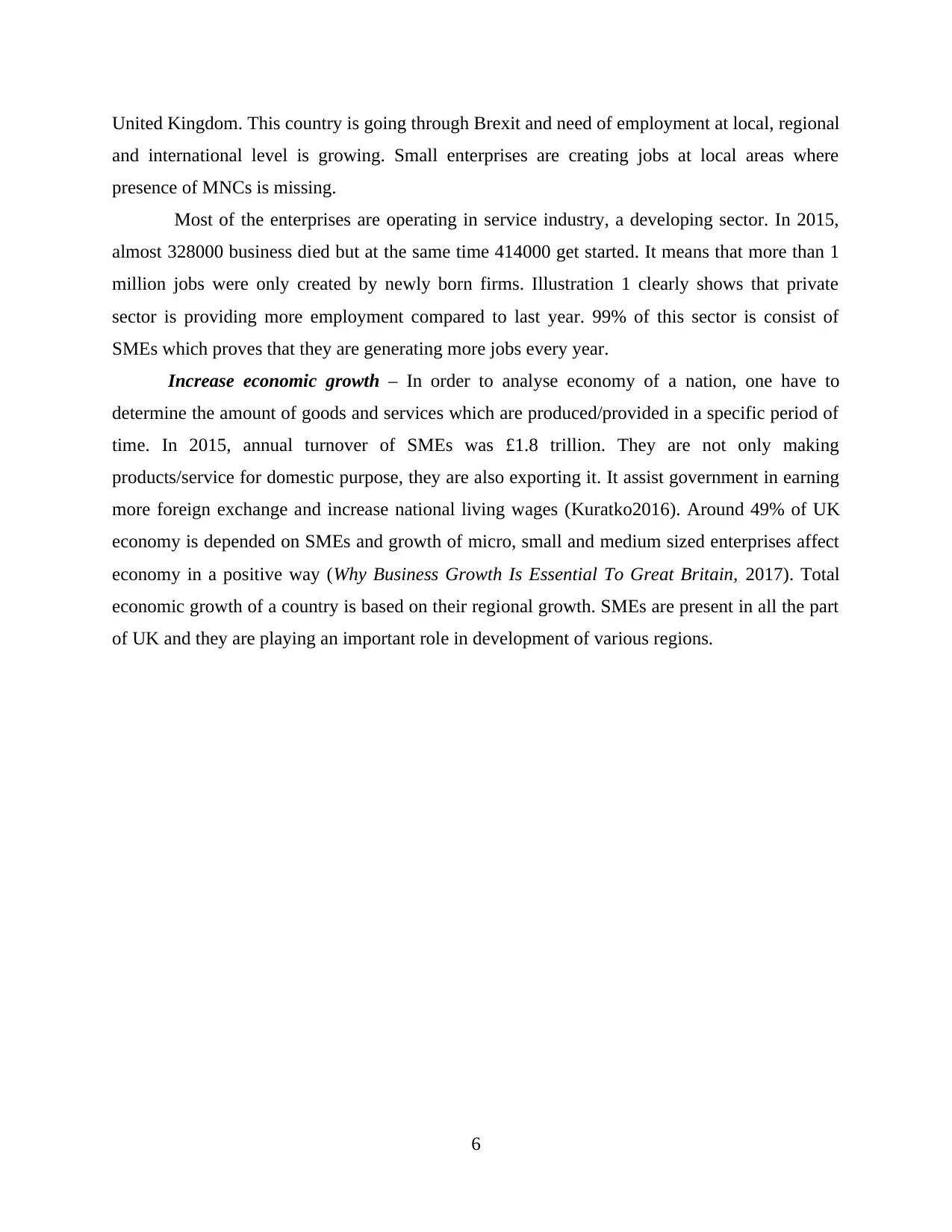
United Kingdom. This country is going through Brexit and need of employment at local, regional
and international level is growing. Small enterprises are creating jobs at local areas where
presence of MNCs is missing.
Most of the enterprises are operating in service industry, a developing sector. In 2015,
almost 328000 business died but at the same time 414000 get started. It means that more than 1
million jobs were only created by newly born firms. Illustration 1 clearly shows that private
sector is providing more employment compared to last year. 99% of this sector is consist of
SMEs which proves that they are generating more jobs every year.
Increase economic growth – In order to analyse economy of a nation, one have to
determine the amount of goods and services which are produced/provided in a specific period of
time. In 2015, annual turnover of SMEs was £1.8 trillion. They are not only making
products/service for domestic purpose, they are also exporting it. It assist government in earning
more foreign exchange and increase national living wages (Kuratko2016). Around 49% of UK
economy is depended on SMEs and growth of micro, small and medium sized enterprises affect
economy in a positive way (Why Business Growth Is Essential To Great Britain, 2017). Total
economic growth of a country is based on their regional growth. SMEs are present in all the part
of UK and they are playing an important role in development of various regions.
6
and international level is growing. Small enterprises are creating jobs at local areas where
presence of MNCs is missing.
Most of the enterprises are operating in service industry, a developing sector. In 2015,
almost 328000 business died but at the same time 414000 get started. It means that more than 1
million jobs were only created by newly born firms. Illustration 1 clearly shows that private
sector is providing more employment compared to last year. 99% of this sector is consist of
SMEs which proves that they are generating more jobs every year.
Increase economic growth – In order to analyse economy of a nation, one have to
determine the amount of goods and services which are produced/provided in a specific period of
time. In 2015, annual turnover of SMEs was £1.8 trillion. They are not only making
products/service for domestic purpose, they are also exporting it. It assist government in earning
more foreign exchange and increase national living wages (Kuratko2016). Around 49% of UK
economy is depended on SMEs and growth of micro, small and medium sized enterprises affect
economy in a positive way (Why Business Growth Is Essential To Great Britain, 2017). Total
economic growth of a country is based on their regional growth. SMEs are present in all the part
of UK and they are playing an important role in development of various regions.
6
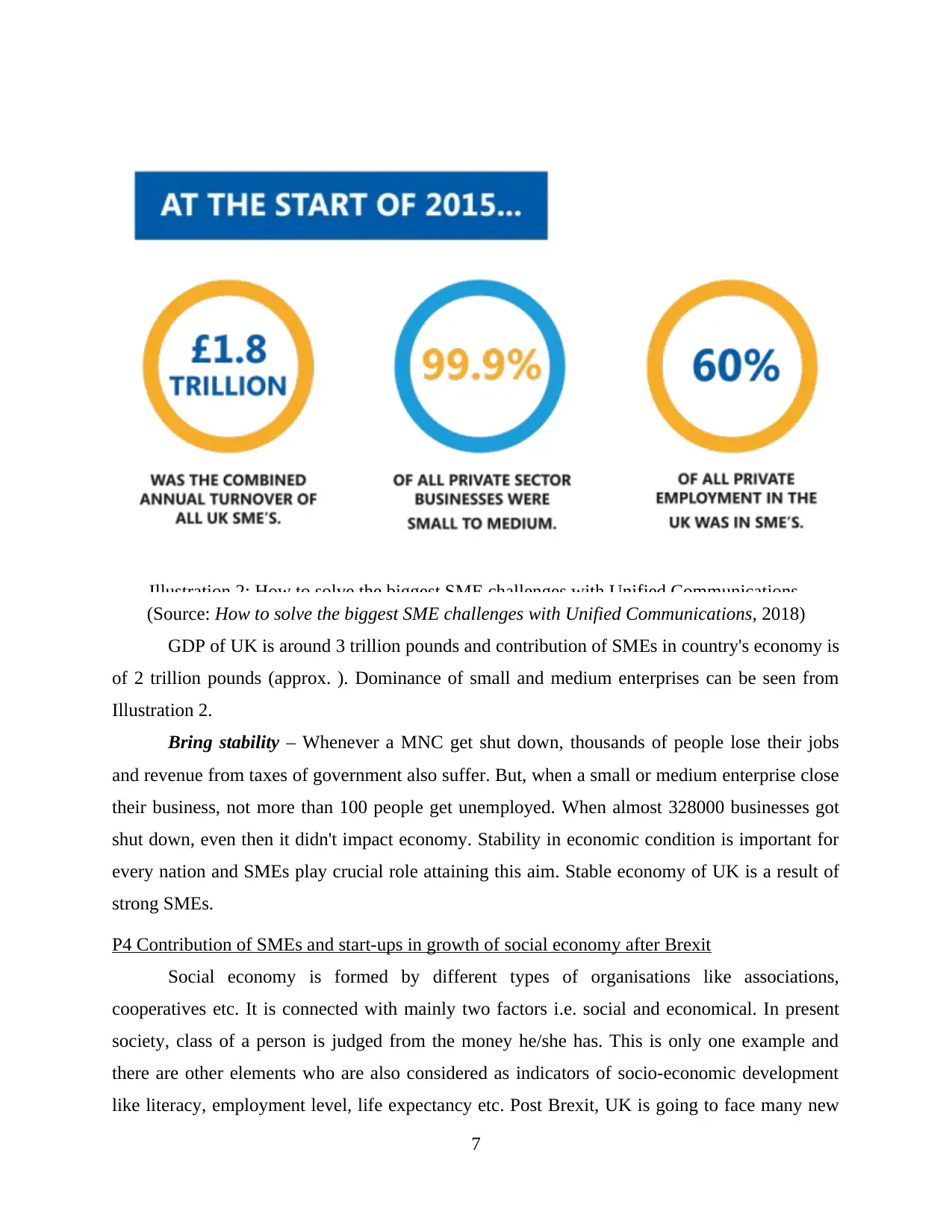
(Source: How to solve the biggest SME challenges with Unified Communications, 2018)
GDP of UK is around 3 trillion pounds and contribution of SMEs in country's economy is
of 2 trillion pounds (approx. ). Dominance of small and medium enterprises can be seen from
Illustration 2.
Bring stability – Whenever a MNC get shut down, thousands of people lose their jobs
and revenue from taxes of government also suffer. But, when a small or medium enterprise close
their business, not more than 100 people get unemployed. When almost 328000 businesses got
shut down, even then it didn't impact economy. Stability in economic condition is important for
every nation and SMEs play crucial role attaining this aim. Stable economy of UK is a result of
strong SMEs.
P4 Contribution of SMEs and start-ups in growth of social economy after Brexit
Social economy is formed by different types of organisations like associations,
cooperatives etc. It is connected with mainly two factors i.e. social and economical. In present
society, class of a person is judged from the money he/she has. This is only one example and
there are other elements who are also considered as indicators of socio-economic development
like literacy, employment level, life expectancy etc. Post Brexit, UK is going to face many new
7
Illustration 2: How to solve the biggest SME challenges with Unified Communications.
GDP of UK is around 3 trillion pounds and contribution of SMEs in country's economy is
of 2 trillion pounds (approx. ). Dominance of small and medium enterprises can be seen from
Illustration 2.
Bring stability – Whenever a MNC get shut down, thousands of people lose their jobs
and revenue from taxes of government also suffer. But, when a small or medium enterprise close
their business, not more than 100 people get unemployed. When almost 328000 businesses got
shut down, even then it didn't impact economy. Stability in economic condition is important for
every nation and SMEs play crucial role attaining this aim. Stable economy of UK is a result of
strong SMEs.
P4 Contribution of SMEs and start-ups in growth of social economy after Brexit
Social economy is formed by different types of organisations like associations,
cooperatives etc. It is connected with mainly two factors i.e. social and economical. In present
society, class of a person is judged from the money he/she has. This is only one example and
there are other elements who are also considered as indicators of socio-economic development
like literacy, employment level, life expectancy etc. Post Brexit, UK is going to face many new
7
Illustration 2: How to solve the biggest SME challenges with Unified Communications.
⊘ This is a preview!⊘
Do you want full access?
Subscribe today to unlock all pages.

Trusted by 1+ million students worldwide
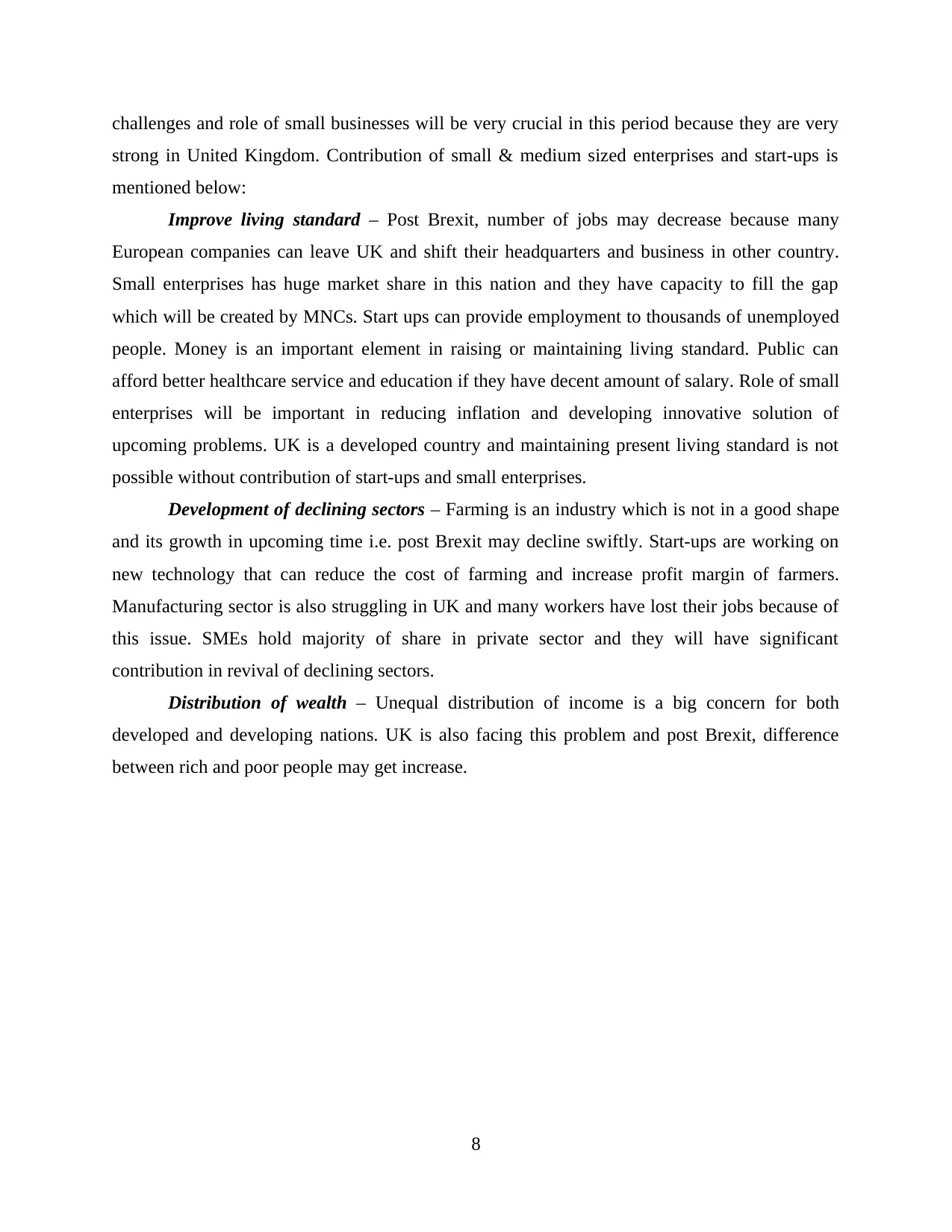
challenges and role of small businesses will be very crucial in this period because they are very
strong in United Kingdom. Contribution of small & medium sized enterprises and start-ups is
mentioned below:
Improve living standard – Post Brexit, number of jobs may decrease because many
European companies can leave UK and shift their headquarters and business in other country.
Small enterprises has huge market share in this nation and they have capacity to fill the gap
which will be created by MNCs. Start ups can provide employment to thousands of unemployed
people. Money is an important element in raising or maintaining living standard. Public can
afford better healthcare service and education if they have decent amount of salary. Role of small
enterprises will be important in reducing inflation and developing innovative solution of
upcoming problems. UK is a developed country and maintaining present living standard is not
possible without contribution of start-ups and small enterprises.
Development of declining sectors – Farming is an industry which is not in a good shape
and its growth in upcoming time i.e. post Brexit may decline swiftly. Start-ups are working on
new technology that can reduce the cost of farming and increase profit margin of farmers.
Manufacturing sector is also struggling in UK and many workers have lost their jobs because of
this issue. SMEs hold majority of share in private sector and they will have significant
contribution in revival of declining sectors.
Distribution of wealth – Unequal distribution of income is a big concern for both
developed and developing nations. UK is also facing this problem and post Brexit, difference
between rich and poor people may get increase.
8
strong in United Kingdom. Contribution of small & medium sized enterprises and start-ups is
mentioned below:
Improve living standard – Post Brexit, number of jobs may decrease because many
European companies can leave UK and shift their headquarters and business in other country.
Small enterprises has huge market share in this nation and they have capacity to fill the gap
which will be created by MNCs. Start ups can provide employment to thousands of unemployed
people. Money is an important element in raising or maintaining living standard. Public can
afford better healthcare service and education if they have decent amount of salary. Role of small
enterprises will be important in reducing inflation and developing innovative solution of
upcoming problems. UK is a developed country and maintaining present living standard is not
possible without contribution of start-ups and small enterprises.
Development of declining sectors – Farming is an industry which is not in a good shape
and its growth in upcoming time i.e. post Brexit may decline swiftly. Start-ups are working on
new technology that can reduce the cost of farming and increase profit margin of farmers.
Manufacturing sector is also struggling in UK and many workers have lost their jobs because of
this issue. SMEs hold majority of share in private sector and they will have significant
contribution in revival of declining sectors.
Distribution of wealth – Unequal distribution of income is a big concern for both
developed and developing nations. UK is also facing this problem and post Brexit, difference
between rich and poor people may get increase.
8
Paraphrase This Document
Need a fresh take? Get an instant paraphrase of this document with our AI Paraphraser
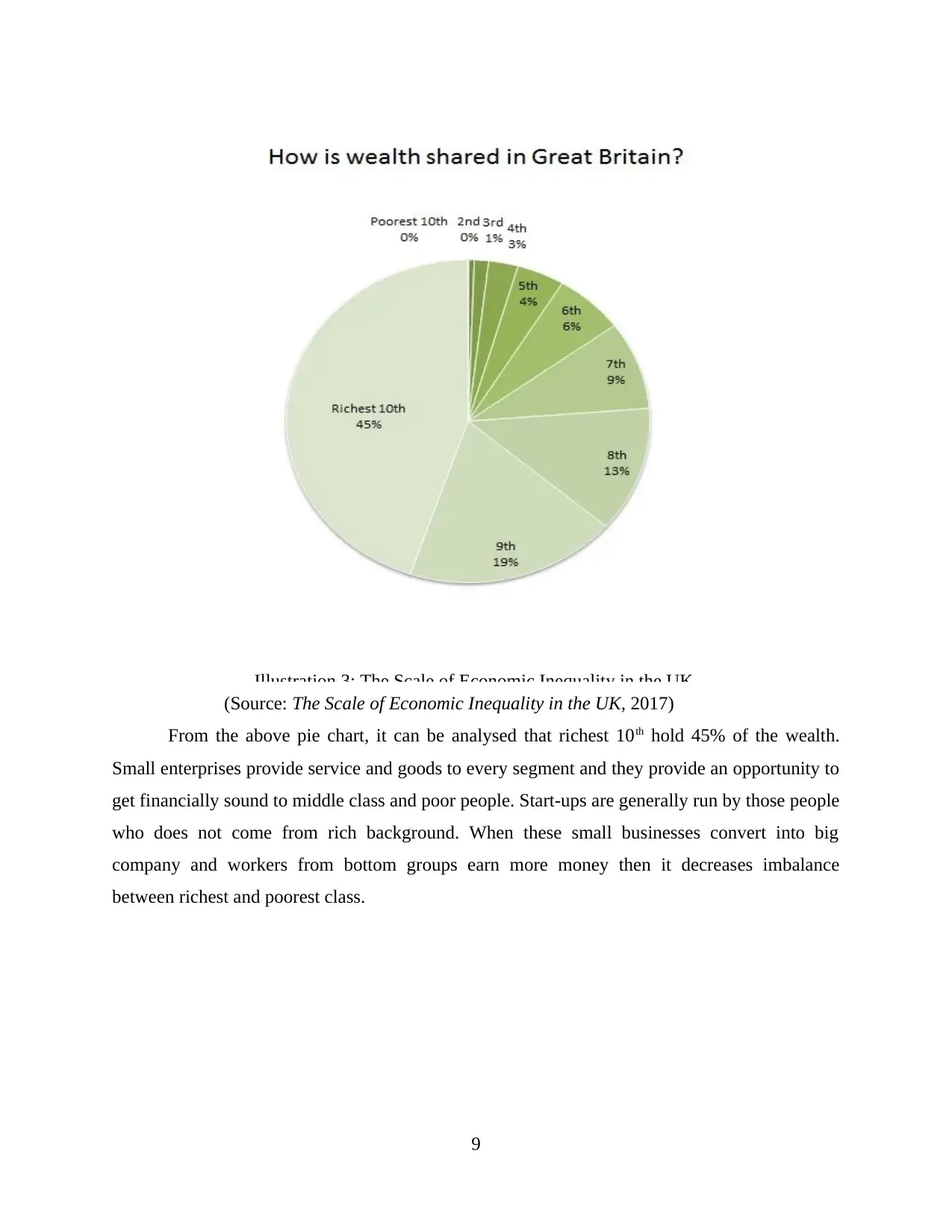
(Source: The Scale of Economic Inequality in the UK, 2017)
From the above pie chart, it can be analysed that richest 10th hold 45% of the wealth.
Small enterprises provide service and goods to every segment and they provide an opportunity to
get financially sound to middle class and poor people. Start-ups are generally run by those people
who does not come from rich background. When these small businesses convert into big
company and workers from bottom groups earn more money then it decreases imbalance
between richest and poorest class.
9
Illustration 3: The Scale of Economic Inequality in the UK.
From the above pie chart, it can be analysed that richest 10th hold 45% of the wealth.
Small enterprises provide service and goods to every segment and they provide an opportunity to
get financially sound to middle class and poor people. Start-ups are generally run by those people
who does not come from rich background. When these small businesses convert into big
company and workers from bottom groups earn more money then it decreases imbalance
between richest and poorest class.
9
Illustration 3: The Scale of Economic Inequality in the UK.
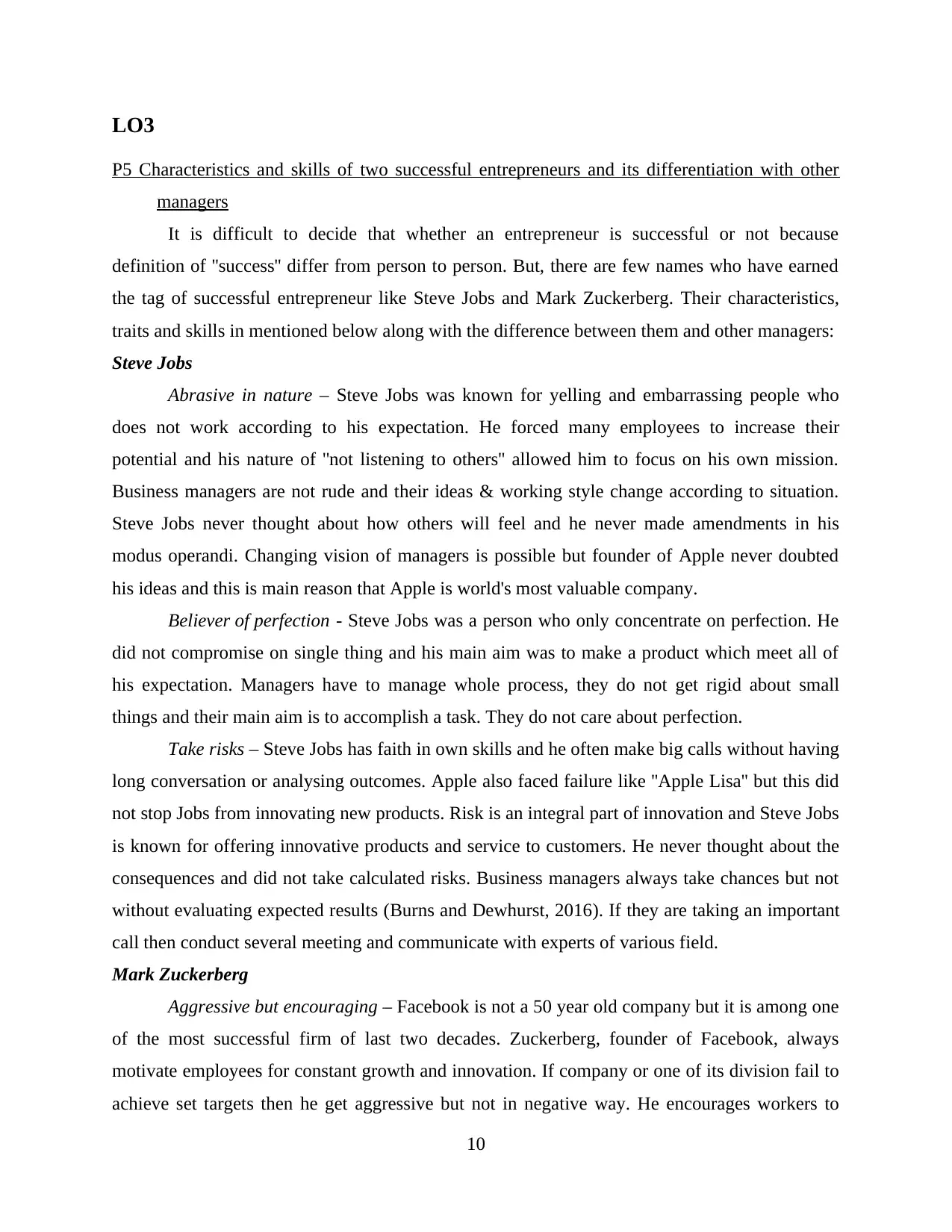
LO3
P5 Characteristics and skills of two successful entrepreneurs and its differentiation with other
managers
It is difficult to decide that whether an entrepreneur is successful or not because
definition of ''success'' differ from person to person. But, there are few names who have earned
the tag of successful entrepreneur like Steve Jobs and Mark Zuckerberg. Their characteristics,
traits and skills in mentioned below along with the difference between them and other managers:
Steve Jobs
Abrasive in nature – Steve Jobs was known for yelling and embarrassing people who
does not work according to his expectation. He forced many employees to increase their
potential and his nature of ''not listening to others'' allowed him to focus on his own mission.
Business managers are not rude and their ideas & working style change according to situation.
Steve Jobs never thought about how others will feel and he never made amendments in his
modus operandi. Changing vision of managers is possible but founder of Apple never doubted
his ideas and this is main reason that Apple is world's most valuable company.
Believer of perfection - Steve Jobs was a person who only concentrate on perfection. He
did not compromise on single thing and his main aim was to make a product which meet all of
his expectation. Managers have to manage whole process, they do not get rigid about small
things and their main aim is to accomplish a task. They do not care about perfection.
Take risks – Steve Jobs has faith in own skills and he often make big calls without having
long conversation or analysing outcomes. Apple also faced failure like ''Apple Lisa'' but this did
not stop Jobs from innovating new products. Risk is an integral part of innovation and Steve Jobs
is known for offering innovative products and service to customers. He never thought about the
consequences and did not take calculated risks. Business managers always take chances but not
without evaluating expected results (Burns and Dewhurst, 2016). If they are taking an important
call then conduct several meeting and communicate with experts of various field.
Mark Zuckerberg
Aggressive but encouraging – Facebook is not a 50 year old company but it is among one
of the most successful firm of last two decades. Zuckerberg, founder of Facebook, always
motivate employees for constant growth and innovation. If company or one of its division fail to
achieve set targets then he get aggressive but not in negative way. He encourages workers to
10
P5 Characteristics and skills of two successful entrepreneurs and its differentiation with other
managers
It is difficult to decide that whether an entrepreneur is successful or not because
definition of ''success'' differ from person to person. But, there are few names who have earned
the tag of successful entrepreneur like Steve Jobs and Mark Zuckerberg. Their characteristics,
traits and skills in mentioned below along with the difference between them and other managers:
Steve Jobs
Abrasive in nature – Steve Jobs was known for yelling and embarrassing people who
does not work according to his expectation. He forced many employees to increase their
potential and his nature of ''not listening to others'' allowed him to focus on his own mission.
Business managers are not rude and their ideas & working style change according to situation.
Steve Jobs never thought about how others will feel and he never made amendments in his
modus operandi. Changing vision of managers is possible but founder of Apple never doubted
his ideas and this is main reason that Apple is world's most valuable company.
Believer of perfection - Steve Jobs was a person who only concentrate on perfection. He
did not compromise on single thing and his main aim was to make a product which meet all of
his expectation. Managers have to manage whole process, they do not get rigid about small
things and their main aim is to accomplish a task. They do not care about perfection.
Take risks – Steve Jobs has faith in own skills and he often make big calls without having
long conversation or analysing outcomes. Apple also faced failure like ''Apple Lisa'' but this did
not stop Jobs from innovating new products. Risk is an integral part of innovation and Steve Jobs
is known for offering innovative products and service to customers. He never thought about the
consequences and did not take calculated risks. Business managers always take chances but not
without evaluating expected results (Burns and Dewhurst, 2016). If they are taking an important
call then conduct several meeting and communicate with experts of various field.
Mark Zuckerberg
Aggressive but encouraging – Facebook is not a 50 year old company but it is among one
of the most successful firm of last two decades. Zuckerberg, founder of Facebook, always
motivate employees for constant growth and innovation. If company or one of its division fail to
achieve set targets then he get aggressive but not in negative way. He encourages workers to
10
⊘ This is a preview!⊘
Do you want full access?
Subscribe today to unlock all pages.

Trusted by 1+ million students worldwide
1 out of 15
Related Documents
Your All-in-One AI-Powered Toolkit for Academic Success.
+13062052269
info@desklib.com
Available 24*7 on WhatsApp / Email
![[object Object]](/_next/static/media/star-bottom.7253800d.svg)
Unlock your academic potential
Copyright © 2020–2026 A2Z Services. All Rights Reserved. Developed and managed by ZUCOL.




